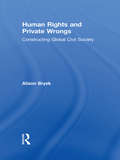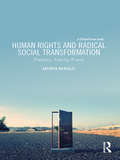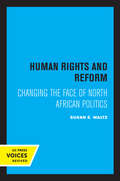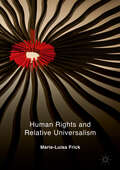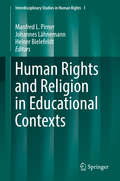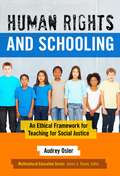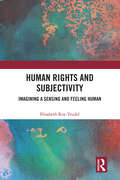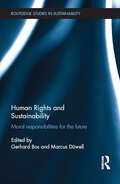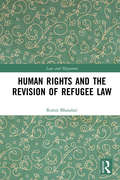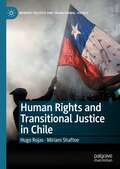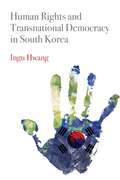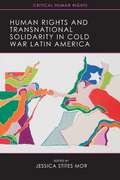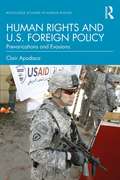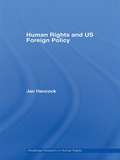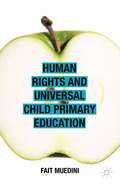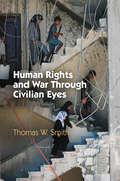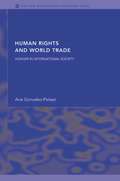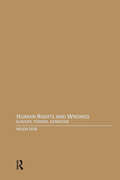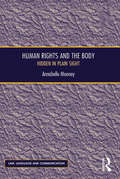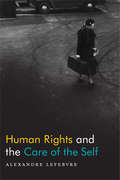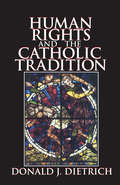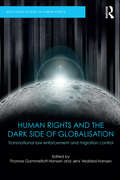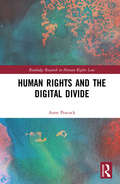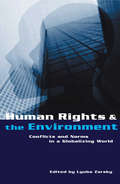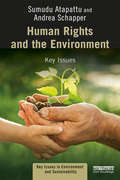- Table View
- List View
Human Rights and Private Wrongs: Constructing Global Civil Society
by Alison BryskHuman Rights and Private Wrongs breaks new ground by considering a series of fascinating issues that are normally ignored by human rights specialists because they are too "private" to consider as policy issues: children's labor migration; refugee policy towards unaccompanied minors; financial matters of investor and business responsibility; and complex questions involving access to the benefits of pharmaceutical research, transnational organ trafficking, and the control over genetic research.
Human Rights and Radical Social Transformation: Futurity, Alterity, Power
by Kathryn McNeillyAgainst the recent backdrop of sociopolitical crisis, radical thinking and activism to challenge the oppressive operation of power has increased. Such thinkers and activists have aimed for radical social transformation in the sense of challenging dominant ways of viewing the world, including the neoliberal illusion of improving the welfare of all while advancing the interests of only some. However, a question mark has remained over the utility of human rights in this activity and the capability of rights to challenge, as opposed to reinforce, discourses such as liberalism, capitalism, internationalism and statism. It is at this point that the present work aims to intervene. Drawing upon critical legal theory, radical democratic thinking and feminist perspectives, Human Rights and Radical Social Transformation seeks to reassess the radical possibilities for human rights and explore how rights may be re-engaged as a tool to facilitate radical social change via the concept of ‘human rights to come’. This idea proposes a reconceptualisation of human rights in theory and practice which foregrounds human rights as inherently futural and capable of sustaining a critical relation to power and alterity in radical politics.
Human Rights and Reform: Changing the Face of North African Politics
by Susan E. WaltzIndependence from colonial rule did not usher in the halcyon days many North Africans had hoped for, as the new governments in Morocco, Tunisia, and Algeria soon came to rely on repression to reinforce and maintain power. In response to widespread human rights abuses, individuals across the Maghrib began to form groups in the late 1970s to challenge the political practices and structures in the region, and over time these independent human rights organizations became prominent political actors. The activists behind them are neither saints nor revolutionaries, but political reformers intent on changing political patterns that have impeded democratization. This study, the first systematic comparative analysis of North African politics in more than a decade, explores the ability of society, including Islamist forces, to challenge the powers of states. Locating Maghribi polities within their cultural and historical contexts, Waltz traces state-society relations in the contemporary period. Even as Algeria totters at the brink of civil war and security concerns rise across the region, the human rights groups Susan Waltz examines implicitly challenge the authoritarian basis of political governance. Their efforts have not led to the democratic transition many had hoped, but human rights have become a crucial new element of North African political discourse. This title is part of UC Press's Voices Revived program, which commemorates University of California Press’s mission to seek out and cultivate the brightest minds and give them voice, reach, and impact. Drawing on a backlist dating to 1893, Voices Revived makes high-quality, peer-reviewed scholarship accessible once again using print-on-demand technology. This title was originally published in 1995.
Human Rights and Relative Universalism
by Marie-Luisa FrickThis book argues that human rights cannot go global without going local. This important lesson from the winding debates on universalism and particularism raises intricate questions: what are human rights after all, given the dissent surrounding their foundations, content, and scope? What are legitimate deviances from classical human rights (law) and where should we draw “red lines”? Making a case for balancing conceptual openness and distinctness, this book addresses the key human rights issues of our time and opens up novel spaces for deliberation. It engages philosophical reasoning with law, politics, and religion and demonstrates that a meaningful relativist account of human rights is not only possible, but a sorely needed antidote to dogmatism and polarization.
Human Rights and Religion in Educational Contexts
by Manfred L. Pirner Johannes Lähnemann Heiner BielefeldtWhat is the role of religion(s) in a human rights culture and in human rights education? How do human rights and religion relate in the context of public education? And what can religious education at public schools contribute to human rights education? These are the core questions addressed by this book. Stimulating deliberations, illuminating analyses and promising conceptual perspectives are offered by renowned experts from ten countries and diverse academic disciplines.
Human Rights and Schooling: An Ethical Framework for Teaching for Social Justice (Muliticultural Education)
by Audrey OslerMost of the struggles for equitable schooling, including multicultural curricula and culturally responsive teaching, have largely taken place on a local or national stage, with little awareness of how international human rights standards might support these struggles. <p><p>Human Rights and Schooling explores the potential of human rights frameworks to support grassroots struggles for justice and examines the impact that human rights and child rights education can make in the lives of students, including the most marginalized. The author, Audrey Osler, examines the theory, research, and practice linking human rights to education in order to broaden the concept of citizenship and social studies education. <p><p>Bringing scholarship and practice together, the text uses concrete examples to illustrate the links between principles and ideals and actual efforts to realize social justice in and through education. Osler anchors her examination of human rights in the U.N Convention on the Rights of the Child, as well as the U.N. Declaration on Human Rights Education and Training.
Human Rights and Subjectivity: Imagining a Sensing and Feeling Human
by Elisabeth Roy-TrudelThis book draws on a range of theoretical frameworks to challenge the limited conception of subjectivity upon which human rights are based.The book focuses on some of the ways in which dominant discourses are in tension with human rights’ fundamental claim to universality by ignoring multiple ways of being. Different theoretical and methodological approaches are used to analyse this creation of exclusions. These include Hannah Arendt’s figure of the refugee, posthumanist critiques and non-Western critical theories such as Black, Indigenous and decolonial approaches. Often these approaches are used in isolation, but together they reveal how the dominant concept of subjectivity has always needed an ‘Other’ and that the ‘human’ at the heart of human rights is not a universal concept. The book also pursues an analysis of visual discourses in the field of international human rights, with a focus on the ways in which exclusions are represented and entrenched through the visual. It argues that international human rights are based on a vision-centred sensorium and certain processes of reasoning that exclude emotions. Finally, the book considers how international human rights could embrace other forms of thinking and being in the world and recognize different sensory experiences.This original perspective on the limits of human rights will appeal to legal theorists, socio-legal scholars, and others working in politics, sociology, anthropology and cultural studies with an interest in contemporary approaches to social justice and critical approaches.
Human Rights and Sustainability: Moral responsibilities for the future (Routledge Studies in Sustainability)
by Gerhard Bos and Marcus DüwellThe history of human rights suggests that individuals should be empowered in their natural, political, political, social and economic vulnerabilities. States within the international arena hold each other responsible for doing just that and support or interfere where necessary. States are to protect these essential human vulnerabilities, even when this is not a matter of self-interest. This function of human rights is recognized in contexts of intervention, genocide, humanitarian aid and development. This book develops the idea of environmental obligations as long-term responsibilities in the context of human rights. It proposes that human rights require recognition that, in the face of unsustainable conduct, future human persons are exposed and vulnerable. It explores the obstacles for long-term responsibilities that human rights law provides at the level of international and national law and challenges the question of whether lifestyle restrictions are enforceable in view of liberties and levels of wellbeing typically seen as protected by human rights. The book will be of interest to postgraduates studying Human Rights, Sustainability, Law and Philosophy.
Human Rights and The Revision of Refugee Law (Law and Migration)
by Romit BhandariThis book addresses the relationship between International Refugee Law and International Human Rights Law. Using international refugee law’s analytical turn to human rights as its object of inquiry, it represents a critical intervention into the revisionism that has led to conceptual fragmentation and restrictive practices. Mainstream literature in refugee law reflects a mood of celebration, a narrative of progress which praises the discipline’s rescue from obsolescence. This is commonly ascribed to its repositioning alongside human rights law, its veritable rediscovery as an arm of this far greater edifice. By using human rights logic to construct the current legal paradigm and inform us of who qualifies as a refugee, this purportedly lent areas of conceptual uncertainty a set of objective, modern criteria and increased enfranchisement to new, non-traditional claimants. The present work challenges this dominant position by finding the untold limits of its current paradigm. It stands alone in this orientation and hereby represents one of the most comprehensive, heterodox and structurally detailed reviews of this connection. The exploration of the gap between modern approaches and the unsatisfactory realities of seeking asylum forms the substance of this book. It asserts, by contrast, the existence of revolution rather than evolution. Human rights law has erased the founding tenets of the Refugee Convention, enabling powerful states to contain refugees in their region of origin. The book will be essential reading for those interested in Refugee Law, Refugee Studies, Postcolonial Legal Studies, Postmodern Critiques and Critical Legal Theory. Additionally, given its relevance for the adjudication of refugee claims, it will be an important resource for solicitors, barristers and judges.
Human Rights and Transitional Justice in Chile (Memory Politics and Transitional Justice)
by Hugo Rojas Miriam ShaftoeThis book offers a synthesis of the main achievements and pending challenges during the thirty years of transitional justice in Chile after Augusto Pinochet’s dictatorship. The Chilean experience provides useful comparative perspectives for researchers, students and human rights activists engaged in transitional justice processes around the world. The first chapter explains the theoretical foundations of human rights and transitional justice. The second chapter discusses the main historical milestones in Chile’s recent history which have defined the course of the process of transitional justice. The following chapters provide an overview of the key elements of transitional justice in Chile: truth, reparations, memory, justice, and guarantees of non-repetition.
Human Rights and Transnational Democracy in South Korea (Pennsylvania Studies in Human Rights)
by Ingu HwangDrawing on previously unused or underutilized archival sources, this book offers the first account of the historical intersection between South Korea's democratic transition and the global human rights boom in the 1970s. It shows how local pro-democracy activists pragmatically engaged with global advocacy groups, especially Amnesty International and the World Council of Churches, to maximize their socioeconomic and political struggles against the backdrop of South Korea's authoritarian industrialization and U.S. hegemony in East Asia. Ingu Hwang details how local prodemocracy protesters were able to translate their sufferings and causes into international human rights claims that highlighted how U.S. Cold War geopolitics impeded democratization in South Korea. In tracing the increasing coalitional ties between local pro-democracy protests and transnational human rights activism, the book also calls attention to the parallel development of counteraction human rights policies by the South Korean regime and US administrations. These counteractions were designed to safeguard the regime's legitimacy and to ensure the US Cold War security consensus. Thus, Hwang argues that local disputes over democratization in South Korea became transnational contestations on human rights through the development of trans-Pacific human rights politics.Human Rights and Transnational Democracy in South Korea critically engages with studies on global human rights, contemporary Korea, and U.S. Cold War policy. By presenting a bottom-up approach to the shaping of global human rights activism, it contributes to a growing body of literature that challenges European/U.S. centric accounts of human rights advocacy and moves beyond the national and mjinjung (people's) framework traditionally used to detail Korea's democratic transition.
Human Rights and Transnational Solidarity in Cold War Latin America
by Jessica Stites MorWith the end of the global Cold War, the struggle for human rights has emerged as one of the most controversial forces of change in Latin America. Many observers seek the foundations of that movement in notions of rights and models of democratic institutions that originated in the global North. Challenging that view, this volume argues that Latin American community organizers, intellectuals, novelists, priests, students, artists, urban pobladores, refugees, migrants, and common people have contributed significantly to new visions of political community and participatory democracy. These local actors built an alternative transnational solidarity from below with significant participation of the socially excluded and activists in the global South. Edited by Jessica Stites Mor, this book offers fine-grained case studies that show how Latin America’s re-emerging Left transformed the struggles against dictatorship and repression of the Cold War into the language of anti-colonialism, socioeconomic rights, and identity.
Human Rights and U.S. Foreign Policy: Prevarications and Evasions (Routledge Studies in Human Rights)
by Clair ApodacaHuman Rights and U.S. Foreign Policy provides a comprehensive historical overview and analysis of the complex and often vexing problem of understanding the formation of U.S. human rights policy. The proper place of human rights and fundamental freedoms in U.S. foreign policy has long been debated among scholars, politicians, and the American public. Clair Apodaca argues that the history of U.S.human rights policy unfolds as a series of prevarications that are the result of presidential preferences, along with the conflict and cooperation among bureaucratic actors. Through a series of chapters devoted to U.S. presidential administrations from Richard Nixon to the present, she delivers a comprehensive historical, social, and cultural context to understand the development and implementation of U.S. human rights policy. For each administration, she pays close attention to how ideology, bureaucratic politics, lobbying, and competition affect the inclusion or exclusion of human rights in the economic and military aid allocation decisions of the United States. She further demonstrates that from the inception of U.S. human rights policy, presidents have attempted to tell only part of the truth or to reformulate the truth by redefining the meaning of the terms "human rights," "democracy," or "torture," for example. In this way, human rights policy has been about prevarication. Human Rights and U.S. Foreign Policy is a key text for students, which will appeal to all readers who will find a historically informed, argument driven account of the erratic evolution of U.S. human rights policy since the Nixon Administration.
Human Rights and US Foreign Policy (Routledge Research in Human Rights #Vol. 1)
by Jan HancockThis book analyzes the role of human rights in the foreign policy of the George W. Bush Administrations. References to human rights, freedom and democracy became prominent explanations for post-9/11 foreign policy, yet human rights have been neither impartially nor universally integrated into decision-making. Jan Hancock addresses this apparent paradox by considering three distinct explanations. The first position holds that human rights form a constitutive foreign policy goal, the second that evident double standards refute the first perspective. This book seeks to progress beyond this familiar discussion by employing a Foucaultian method of discourse analysis to suggest a third explanation. Through this analysis, the author examines how a discourse of human rights has been artificially produced and implemented in the presentation of US foreign policy. This illuminating study builds on a wealth of primary source evidence from human rights organizations to document the contradictions between the claims and practice of human rights made by the Bush Administrations, as well as the political significance of denying this disjuncture. Human Rights and US Foreign Policy will be of interest to advanced students and researchers of US foreign policy, human rights, international relations and security studies.
Human Rights and Universal Child Primary Education
by Fait MuediniThis book examines the progress toward universal child primary education, and the obstacles that remain. Fait Muedini describes the current state of child primary education, the international laws that support the right to free childhood education, and the positive gains that are paving the way to universal free schooling. He also discusses remaining legal and logistical roadblocks still to be overcome by the NGOs and international organizations that strive to deliver free education to allchildren. The benefits to free primary education ripple throughout the world system, and this discussion illuminates the current state of universal education delivery and points the way to next steps.
Human Rights and War Through Civilian Eyes (Pennsylvania Studies in Human Rights)
by Thomas SmithInternational lawyers and ethicists have long judged wars from the perspective of the state and its actions, developing international humanitarian law by asking such questions as "Are the belligerents justified in entering the conflict?" and "How should they conduct themselves during the war's execution?" and "When civilian noncombatants are harmed, who is responsible for their suffering?" <P><P>Human Rights and War Through Civilian Eyes reimagines the ethics of war from the standpoint of its collateral victims, focusing on the effects of war on individuals—on those who are terrorized, or killed, or whose lives are violently disrupted. Upholding a human rights analysis of war, Thomas W. Smith conveys vividly the depth of human loss and the narrowing of everyday life brought about by armed conflict. <P><P>Through riveting case studies of the Iraq War and the recent Gaza conflicts, Smith shows how even combatants who profess to follow the laws of war often engage in appalling violence and brutality, cutting short civilian lives, ruining economies, rending social fabrics, and collapsing public infrastructure. A focus on the human dimension of warfare makes clear the limits of international humanitarian law, and underscores how human rights perspectives increase its efficacy. <P><P> At a moment when liberal states are rethinking the ethics of war as they seek to extricate themselves from unjust or unwise conflicts and taking on the responsibility to intervene to protect vulnerable people from slaughter, Human Rights and War helps us see with bracing clarity the devastating impact of war on innocent people.
Human Rights and World Trade: Hunger in International Society (New International Relations)
by Ana Gonzalez-PelaezA new and incisive analysis of the political viability of human rights, with an in-depth investigation of its largest violation: world hunger. Gonzalez-Pelaez develops John Vincent's theory of basic human rights within the context of the international political economy and demonstrates how the right to food has become an international norm enshrined within international law. She then assesses the international normative and practical dimensions of hunger in connection with international trade and poverty. Using the society of states as the framework of analysis, she explores the potential that the current system has to correct its own anomalies, and examines the measures that can move the hunger agenda forward in order to break through its current stagnation.
Human Rights and Wrongs: Slavery, Terror, Genocide
by Helen FeinHuman Rights and Wrongs explains the persistence of crimes against humanity since the Holocaust-including slavery, terror, and genocide. Using extended country descriptions and analyses, the book goes beyond case studies to explain such gross human rights violations in terms of an integrated theory of life integrity, giving readers vivid illustrations in addition to a theoretical framework. Distinguished author Helen Fein then asks how we can arrest human wrongs and discusses whether democracy is the answer. She shows the positive links among human rights, freedom, and development and draws out policy recommendations from her findings.
Human Rights and the Body: Hidden in Plain Sight (Law, Language and Communication)
by Annabelle MooneyHuman Rights and the Body is a response to the crisis in human rights, to the very real concern that without a secure foundation for the concept of human rights, their very existence is threatened. While there has been consideration of the discourses of human rights and the way in which the body is written upon, research in linguistics has not yet been fully brought to bear on either human rights or the body. Drawing on legal concepts and aspects of the law of human rights, Mooney aims to provide a universally defensible set of human rights and a foundation, or rather a frame, for them. She argues that the proper frames for human rights are firstly the human body, seen as an index reliant on the natural world, secondly the globe and finally, language. These three frames generate rights to food, water, sleep and shelter, environmental protection and a right against dehumanization. This book is essential reading for researchers and graduate students in the fields of human rights and semiotics of law.
Human Rights and the Care of the Self
by Alexandre LefebvreWhen we think of human rights we assume that they are meant to protect people from serious social, legal, and political abuses and to advance global justice. In Human Rights and the Care of the Self Alexandre Lefebvre turns this assumption on its head, showing how the value of human rights also lies in enabling ethical practices of self-transformation. <p><p> Drawing on Foucault's notion of "care of the self," Lefebvre turns to some of the most celebrated authors and activists in the history of human rights–such as Mary Wollstonecraft, Henri Bergson, Eleanor Roosevelt, and Charles Malik–to discover a vision of human rights as a tool for individuals to work on, improve, and transform themselves for their own sake. This new perspective allows us to appreciate a crucial dimension of human rights, one that can help us to care for ourselves in light of pressing social and psychological problems, such as loneliness, fear, hatred, patriarchy, meaninglessness, boredom, and indignity.
Human Rights and the Catholic Tradition
by Donald DietrichFrom the French Revolution to Vatican II, the institutional Catholic Church has opposed much that modernity has offered men and women constructing their societies. This book focuses on the experiences of German Catholics as they have worked to engage their faith with their culture in the midst of the two world wars, the barbarism of the Nazi era, and the uncertainties and conflicts of the post-World War II world.German Catholics have confronted and challenged their Church's anti-modernism, two lost wars, the Weimar Republic, the Nazi Third Reich, the Cold War, German reunification and the impulses of globalization. Catholic theologians and those others nurtured by Catholicism, who resisted Nazism to create their own private spaces, developed a personal and existential theology that bore fruit after 1945. Such theologians as Karl Rahner, Johannes Metz, and Walter Kasper, were rooted in their political experiences and in the renewal movement built by those who attended Vatican II. These theologians were sensitive to the horrors of the Nazi brutalization, the positive contributions of democracy, and the need to create a Catholicism that could join the conversation on human rights following World War II. This dialogue meant accepting non-Catholic religious traditions as authentic expressions of faith, which in turn required that the sacred dignity of every man, woman, and child had to be respected. By the twenty-first century, Catholic theologians had made furthering a human rights agenda part of their tradition, and the German contribution to Catholic theology was crucial to that development. The current Catholic milieu has been forged through its defensive responses to the Enlightenment, through its resistance to ideologies that have supported sanctioned murder, and through an extensive dialogue with its own traditions.In focusing on the German Catholic experience, Dietrich offers a cultural approach to the study of the religious and ethical issues that ground the hum
Human Rights and the Dark Side of Globalisation: Transnational law enforcement and migration control (Routledge Studies in Human Rights)
by Thomas Gammeltoft-Hansen and Jens Vedsted-HansenThis edited volume examines the continued viability of international human rights law in the context of growing transnational law enforcement. With states increasingly making use of global governance modes, core exercises of public authority such as migration control, surveillance, detention and policing, are increasingly conducted extraterritorially, outsourced to foreign governments or delegated to non-state actors. New forms of cooperation raise difficult questions about divided, shared and joint responsibility under international human rights law. At the same time, some governments engage in transnational law enforcement exactly to avoid such responsibilities, creatively seeking to navigate the complex, overlapping and sometimes unclear bodies of international law. As such, this volume argues that this area represents a particular dark side of globalisation, requiring both scholars and practitioners to revisit basic assumptions and legal strategies. The volume will be of great interest to students, scholars and practitioners of international relations, human rights and public international law.
Human Rights and the Digital Divide (Routledge Research in Human Rights Law)
by Anne PeacockThe Internet’s importance for freedom of expression and other rights comes in part from the ability it bestows on users to create and share information, rather than just receive it. Within the context of existing freedom of expression guarantees, this book critically evaluates the goal of bridging the 'digital divide' – the gap between those who have access to the Internet and those who do not. Central to this analysis is the examination of two questions: first, is there a right to access the Internet, and if so, what does that right look like and how far does it extend? Second, if there is a right to access the Internet, is there a legal obligation on States to overcome the digital divide?Through examination of this debate’s history, analysis of case law in the European Court of Human Rights and Inter-American Court of Human Rights, and a case study of one digital inclusion programme in Jalisco, Mexico, this book concludes that there is indeed currently a legal right to Internet access, but one that it is very limited in scope. The 2012 Joint Declaration on Freedom of Expression and the Internet is aspirational in nature, rather than a representative summary of current protections afforded by the international human rights legal framework. This book establishes a critical foundation from which some of these aspirations could be advanced in the future. The digital divide is not just a human rights challenge nor will it be overcome through human rights law alone. Nevertheless, human rights law could and should do more than it has thus far.
Human Rights and the Environment: Conflicts and Norms in a Globalizing World
by Lyuba ZarskyThe impact of environmental damage on human rights - civil, political or welfare and labour rights - is becoming ever-more widely appreciated and has direct bearing on the behaviour of companies and their norms of conduct. In this volume, contributors draw on the tools and insights of a range of disciplines, including law, anthropology, economics, geography and social science, to analyze the issues and show how new standards that protect rights and liberties can be established.
Human Rights and the Environment: Key Issues (Key Issues in Environment and Sustainability)
by Sumudu Atapattu Andrea SchapperThe field of human rights and the environment has grown phenomenally during the last few years and this textbook will be one of the first to encourage students to think critically about how many environmental issues lead to a violation of existing rights. Taking a socio-legal approach, this book will provide a good understanding of both human rights and environmental issues, as well as the limitations of each regime, and will explore the ways in which human rights law and institutions can be used to obtain relief for the victims of environmental degradation or of adverse effects of environmental policies. In addition, it will place an emphasis on climate change and climate policies to highlight the pros and cons of using a human rights framework and to underscore its importance in the context of climate change. As well as identifying emerging issues and areas for further research, each chapter will be rich in pedagogical features, including web links to further research and discussion questions for beyond the classroom. Combining their specialisms in law and politics, Atapattu and Schapper have developed a truly inter-disciplinary resource that will be essential for students of human rights, environmental studies, international law, international relations, politics, and philosophy.
